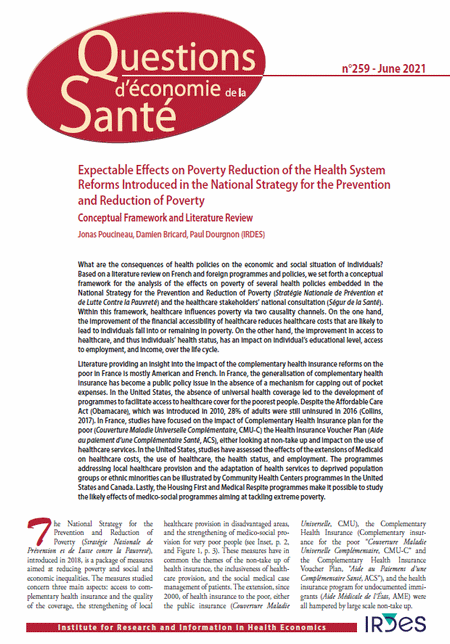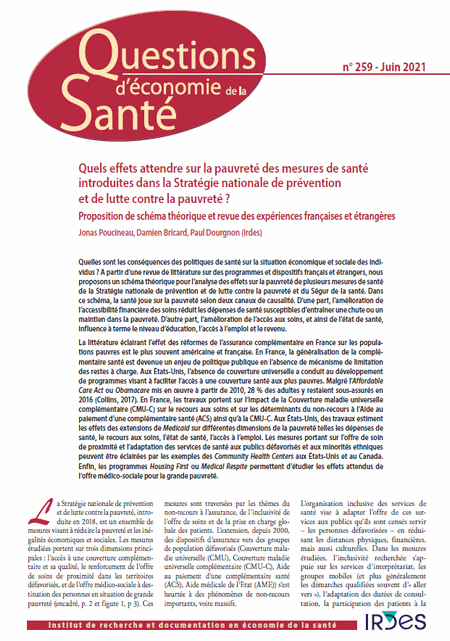Expectable Effects on Poverty Reduction of the Health System Reforms Introduced in the National Strategy for the Prevention and Reduction of Poverty.
Conceptual Framework and Literature Review.
Poucineau J., Bricard D., Dourgnon P.
Questions d'économie de la santé (Issues in Health Economics) n° 259 - June 2021
ABSTRACT
What are the consequences of health policies on the economic and social situation of individuals? Based on a literature review on French and foreign programmes and policies, we set forth a conceptual framework for the analysis of the effects on poverty of several health policies embedded in the National Strategy for the Prevention and Reduction of Poverty (Stratégie Nationale de Prévention et de Lutte Contre la Pauvreté) and the healthcare stakeholders' national consultation (Ségur de la Santé). Within this framework, healthcare influences poverty via two causality channels. On the one hand, the improvement of the financial accessibility of healthcare reduces healthcare costs that are likely to lead to individuals fall into or remaining in poverty. On the other hand, the improvement in access to healthcare, and thus individuals' health status, has an impact on individual's educational level, access to employment, and income, over the life cycle.
Literature providing an insight into the impact of the complementary health insurance reforms on the poor in France is mostly American and French. In France, the generalisation of complementary health insurance has become a public policy issue in the absence of a mechanism for capping out of pocket expenses. In the United States, the absence of universal health coverage led to the development of programmes to facilitate access to healthcare cover for the poorest people. Despite the Affordable Care Act (Obamacare), which was introduced in 2010, 28% of adults were still uninsured in 2016 (Collins, 2017). In France, studies have focused on the impact of Complementary Health Insurance plan for the poor (Couverture Maladie Universelle Complémentaire, CMU-C) the Health Insurance Voucher Plan (Aide au paiement d'une Complémentaire Santé, ACS), either looking at non-take up and impact on the use of healthcare services. In the United States, studies have assessed the effects of the extensions of Medicaid on healthcare costs, the use of healthcare, the health status, and employment. The programmes addressing local healthcare provision and the adaptation of health services to deprived population groups or ethnic minorities can be illustrated by Community Health Centers programmes in the United States and Canada. Lastly, the Housing First and Medical Respite programmes make it possible to study the likely effects of medico-social programmes aiming at tackling extreme poverty.
See also Questions d'économie de la santé n° 259 in French: Quels effets attendre sur la pauvreté des mesures de santé introduites dans la Stratégie nationale de prévention et de lutte contre la pauvreté ? Proposition de schéma théorique et revue des expériences françaises et étrangères.

